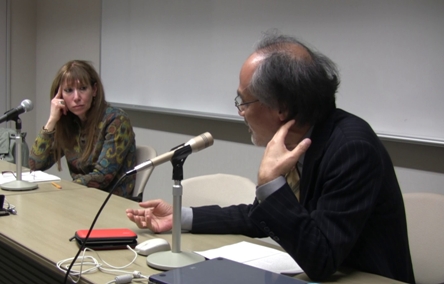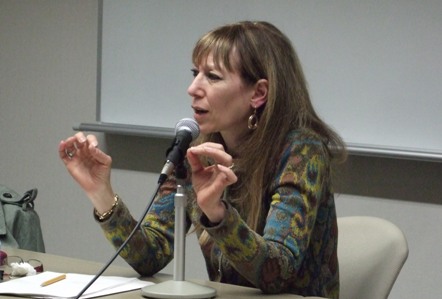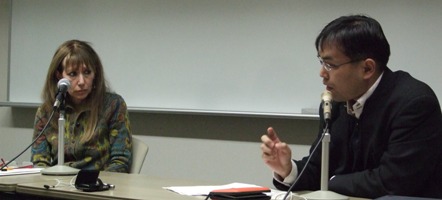[Report] "Learning from the Holocaust"
Reflections on Sara Roy’s Talk "Learning from the Holocaust and the Palestinian-Israeli Conflict" (March 2, 2009)
“It is important to understand the very real differences in volume, scale, and horror between the Holocaust and the [Israeli] occupation and to be careful about comparing the two, but it is also important to recognize parallels where they do exist.”
This passage is taken from a paper Sara Roy wrote in 2002, titled “Living with the Holocaust”. The title of the talk she gave here at UTCP is “Learning from the Holocaust”. These two titles, although hardly representative of her entire body of work, tell us something crucial about the place from which she begins to conduct her critical study of Israel and Palestine. For many people like myself, Jewish, Israeli, this is also the place where we have to begin. I am stating this not because I think that being an Israeli-Jew automatically translates into a certain position, but because I believe it would be dishonest not to state this fact right at the beginning. Perhaps not unlike Sara Roy’ stating that she is a Jewish-American, daughter of Holocaust survivors, with close family ties in Israel. These are inescapable facts that one has to live and work with. Inescapable not in the sense that one knows for sure what they mean, but in the sense that one cannot escape the task of thinking about their meaning.
I will not try to summarize here all the many points of Sara Roy’s talk at UTCP, nor her important critical analysis of Israel’s policies and actions. I wish to focus on one question that marked that talk, and that is the question of learning from the Holocaust.
A delicate question, even a painful one for some. Many, if not most Jews and Israelis would say that anyone who mentions both the Holocaust and the Palestinian’s condition in the same breath is in fact saying that the two are equal. The moment someone mentions the two together, no matter how much they emphasize that there are many, crucial differences—that person is committing a sin against the memory of the Holocaust. According to this view, the two events are so different they cannot possibly be mentioned side by side. But it is more than that: it is that the Holocaust is regarded as completely unique. As an event outside, beyond, all other events. There never was, nor will there ever be such an evil. The scale (six million), the very idea (total destruction of an entire people), the means (transports, camps, gas chambers)—nothing is the same, nothing is even similar.
When it comes to Israel, the ban also becomes an imperative: an imperative to remember and to learn from the Holocaust, but only under certain limitations. One is not allowed to criticize Israel and bring up the name of the Holocaust at the same time. “Never compare”, says the ban, “for what we are doing is incomparable with what the Nazis did”. But there is also another side to this ban, and it is this: “Since what we are doing is incomparable with what the Nazis did, we will not allow you to say that it is morally wrong”. Here, then, are the two faces of the ban: “Never compare, because by comparing you are reducing the Holocaust to the level of some other reality”—“never compare, because by comparing you are making this reality seem as if it is as terrible as the Holocaust”. “Never compare, because what they did was infinitely worse”—“never compare, because what we are doing is infinitely less bad”.
When does the ban on memory become an imperative to remember in one specific way? When does the imperative never to forget what happened turn into a blindness to what is currently happening? When does it turn from a ban on misusing the memory of this event, into a ban on saying anything even slightly critical about Israel’s actions and policies?
Sara Roy, as well as many others, both Jewish and non-Jewish, Israelis and non-Israelis, refuses to remember in this particular way. Yes, it is imperative to remember, to study the Holocaust—but there is more than one way to learn from the it; to live with, after, the Holocaust. Yes, one should refuse to diminish anything of the uniqueness and massiveness of the Shoah—but at the same time one should also refuse the ban of ever placing it side by side other events.
“It is important… to be careful about comparing the two, but it is also important to recognize parallels where they do exist”. Many people close their ears when they hear such things. They refuse to hear precisely what Sara Roy is not saying here: she is not saying that the two are the same. But she does see parallels to the situation in Israel/Palestine, the ban on even discussing the 1948 refugees—not to mention assuming any kind of responsibility—the state of occupation that is approaching its 42nd year, and, most recently, the deadly attack on Gaza.
“How can you compare? This is not genocide! This is not gas-chambers!”. To this Roy answer no, it is not the same—but yes, there are similarities, and yes, there are lessons to be learned, lessons which have not been learned. “No”, she writes, “this is not genocide, but it is repression, and it is brutal”.
It is brutal. It is in the realm of the brutal, the cruel, the wrong, the immoral. Of the things that ought not to be done; not by us, not by anyone. This is the moral fact Roy insists on: the fact that Israelis are causing moral wrongs to Palestinians; that they are making the lives of Palestinians morally unacceptable. Not just hard, unfair, difficult, unequal—but morally wrong. Not just a reality of two people not getting along, a reality of tension, of disagreement, of bureaucratic difficulties, of two different interpretations of historical events, of who has the right to what, of certain emergency policies that should be removed—all of this is there, but is not the main issue. The main issue is that this reality morally indefensible, unjust, unbearable. It is here that the link to the Holocaust begins; it is here that the learning must take place.
No, it’s not six million, not gas chambers, not genocide, no Hitler promising they will be exterminated “like lice”. But it is oppression, it is the denial of rights, it is an inhuman treatment, it is the constant, lasting, systematic depriving of the ability to develop a society, to lead a normal life.
For many people, says Sara Roy, such talk is nothing short of abomination. It is not learning from the Holocaust, but betraying its memory, abusing it. Worse, it is ammunition for Holocaust deniers, for those who say it was never anything like six million, that there were never any gas chambers, etc. Only recently we hear those voices again: the British historian David Irving, the scandal around bishop Richard Williamson, the speeches of Iranian president Ahmadinejad.
Sara Roy bravely refuses this ban, this fear, this moral and intellectual blackmail.

Hannah Arendt, in her book The Origins of Totalitarianism, spoke of three components in the process that victims of the Nazi regime underwent: the elimination of their juridical status, the elimination of their moral status, and finally, the elimination of their very individuality. They were turned into people outside the law, no longer legal entities with legal rights. Then they were ignored morally, treated as if their mistreatment and suffering is meaningless. Finally, in the camps themselves, they became completely non-people. “Superfluous”, as Arendt called it. Things one can get rid of as one sees fit.
“How can one compare? Nowhere is there anything like the third stage, like the complete destruction!”——But what are we saying when we say this? That because the third stage is such radical evil, the first two are tolerable?——“But the situation is completely different! We are not talking about a plan to eliminate a whole people off the face of the earth! We are talking about a conflict, a war!”——And yet, here is the daily reality of what you call, rightly or wrongly, conflict: people without equal legal status, people treated like non-people, people who are completely outside the scope of law and morality; people to whom you can do anything and not suffer the slightest legal sanction, nor feel the slightest moral concern.
To the view that says: “Jews were victims of what is probably the most horrible catastrophe that happened to any people; hence, it is impossible to say that they are victimizers; Jews could never become victimizers”—to this Sara Roy answers: “Jews were victims of this most horrible catastrophe, and hence it is their moral obligation to make sure they never become victimizers”. Yes, there is the imperative never to forget. Yes, there is the imperative “never again”. Not, however, in the sense of “never again shall we, Jews, let such a thing happen to us”—but in the sense that “never again shall we let anything, even if only slightly similar, happen to anyone; and certainly we should never let ourselves cause anything even slightly similar to anyone else”.
* * *
Sara Roy does not mean for this to be the last word. To say that we need to change the way we remember, that we need to learn a different lesson, is not yet to say what this lesson exactly is, what the parallels exactly are, what exactly needs to be done. This moral call is not a simple conclusion or a final verdict. It is a call for change. For a change in our understanding of the past, a change in our view of the present (or perhaps we should say: in our denial of what goes on at present), and a change of what kind of future we try to bring about. It is not to solve all the questions, problems and conflicts, nor to remove all the fears and anxieties, the bad feelings and bad faith. It is only a different beginning. It is a call to begin changing the place of the past in the present, and hence also the way we try to shape the future.
Naveh Frumer
Tokyo, March 2009
——————————
All quotations in italics are from Sara Roy, “Living With The Holocaust: The Journey of a Child of Holocaust Survivors” (Journal of Palestine Studies, Vol 32, No. 1, Autumn 2002) (http://www.palestine-studies.org/journals.aspx?id=4672&jid=1&href=fulltext).








